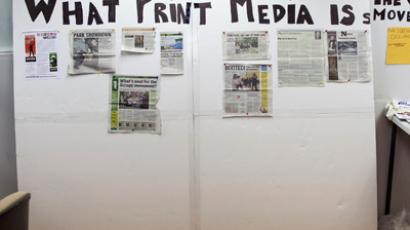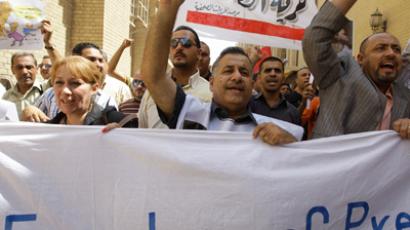Arab Spring govt stance ‘unleashed Twitter, Facebook wars’
Banning mainstream media from reporting on the Arab Spring threw the governments of affected states into a battle with social media hijacked by an uncontrollable opposition propaganda genie, media monitor Sharif Nashashibi told RT.
Sharif Hikmat Nashashibi is the chairman and co-founder of Arab Media Watch, an independent, non-profit watchdog set up in 2000 to strive for objective coverage of Arab issues in the British media.RT: How much diversity have you seen in media reporting on the Arab Spring in general?Sharif Nashashibi: The difficulties the media faced reporting the Arab Spring in all the countries where there have been protests and regime change… That has been the overriding factor.That meant a reliance on citizen journalism, opposition movements etc. The problem of these things is that they are difficult to verify.It is ironic because governments experiencing those protests are constantly complaining that the media rely on opposition movements to get the news. But that is because those governments are stopping the media from going in and doing the job themselves.RT: Does this mean it has been very diverse in terms of who is reporting and what? Has it presented a range of viewpoints?SN: Yes, just like in any conflict we’re witnessing a propaganda war between the various opposition movements and the governments they are fighting, both doing their utmost.The media freedom record has always been bad in that region, but it has really gone nasty during the Arab Spring. But also opposition movements have been very adaptive, using social media to get their point across.Certainly there has been misinformation on all sides. The social media played an incredibly important role because the mainstream media was unable to do the job because of the restrictions and physical dangers they faced. This started the Twitter and Facebook wars.In stopping the media, the governments are actually shooting themselves in the foot, because they are giving the opposition movement the ability to use other means which are more difficult for them to control.RT: And yet there have been a lot of underreported issues?SN: The problem is that due to budget constraints and other factors, the media are really a “one-story machine”. You have a flashpoint somewhere and the media will focus on this flashpoint and the rest falls off the radar. Once that incident is over – they move on to something else. This isn’t necessarily a conspiracy that the media is enabling. They are just unable to cover more than one big story at a time.Because there is so much happening in the Arab world, the Spring is in fact in so many countries. It is impossible for the media to give all these incidents the coverage they deserve – and they do all deserve the same coverage.RT:The picture of the [Arab world] uprisings in the western media is, the opposition has always been right and the government always wrong. Isn’t the situation much more complex?SN: I’m not a spokesperson for the government or opposition… But I think the opposition movements have got things wrong. There have been credible accusations [against them] of misleading and propaganda. But likewise the government does the same thing.RT:What is the future of reporting particularly in North Africa and the Middle East, with Islamists coming to power in the region?SN: I don’t think the rise of Islamist parties in these countries necessarily affects the levels of press freedom. It is early to tell because there has never been press freedom in these countries. It’s going to take some time to build institutions, to train journalists properly and allow journalism to function the way it should.People and journalists are acutely aware of their rights, which they have been denied for so long. It will be much more difficult now that that the genie is out of the bottle to put it back.














